Gabapentin dose for Sleep and Anxiety
For many individuals, struggling with sleep and anxiety issues can be a daily challenge that takes a toll on both their physical and mental well-being. Thankfully, there are various treatment options available to alleviate these symptoms and restore a sense of calm and balance in our lives. One such option is Gabapentin – a medication that has shown promise in improving sleep quality and reducing anxiety symptoms. In this article, we will delve into the benefits, side effects, recommended dosage, and mechanism of action of Gabapentin for sleep and anxiety management.
Benefits of Gabapentin for Sleep and Anxiety
Poor sleep quality can significantly impact overall health and functioning, leading to fatigue, decreased productivity, and impaired cognitive abilities. Similarly, anxiety can leave individuals feeling overwhelmed and on edge, making it difficult to relax and achieve restful sleep. Gabapentin, originally developed to treat epilepsy, has shown potential in addressing these issues.
Research suggests that Gabapentin can help promote better sleep quality by increasing the production of gamma-aminobutyric acid (GABA) in the brain. GABA is a neurotransmitter known for its calming effects on the nervous system. By enhancing GABA levels, Gabapentin can induce relaxation and facilitate a smoother transition into sleep, allowing individuals to enjoy a more restorative sleep experience.

In addition to its sleep-related benefits, Gabapentin has also demonstrated effectiveness in reducing symptoms of anxiety. By regulating the release and uptake of certain neurotransmitters, such as glutamate, Gabapentin can help regulate and stabilize mood, alleviate anxious thoughts, and promote a sense of overall calm.
Gabapentin dose for Sleep and Anxiety
Possible Side-Effects of Gabapentin for Sleep and Anxiety
While Gabapentin holds promise as a treatment option for sleep and anxiety issues, it is essential to understand the potential side effects that may arise from its usage. Some common side effects that individuals may experience include drowsiness, dizziness, blurred vision, and coordination difficulties.
It is crucial to note that side effects can vary among individuals, and some may experience none at all. Additionally, the severity and frequency of side effects can depend on the dosage and duration of Gabapentin usage. Therefore, it is crucial to consult with a healthcare professional before initiating or altering any medication regimen.
Finding the Right Dosage
Determining the appropriate Gabapentin dosage for sleep and anxiety management is a highly individualized process. Several factors, such as age, weight, existing medical conditions, and other medications being taken, need to be considered when determining the optimal dose.
“Gabapentin stands out as a beacon of relief, presenting a personalized path to serenity and balanced well-being.” Dr. Croft
It is not uncommon for healthcare professionals to start patients on a low initial dose and gradually increase it over time. This approach allows for monitoring of the medication’s effects and helps determine the ideal dosage for each individual. Adjusting the dosage in such a manner can help maximize the effectiveness of Gabapentin while minimizing any potential side effects.
Gabapentin dose for Sleep and Anxiety
How Gabapentin Works Against Gabapentin for Sleep and Anxiety
Gabapentin interacts with the brain and nervous system to produce its sleep and anxiety-alleviating effects. The medication primarily targets the neurotransmitter GABA, which plays a crucial role in regulating sleep and anxiety. By increasing GABA levels in the brain, Gabapentin enhances its inhibitory effects, leading to decreased neural firing and a calming sensation.
In addition to its effects on GABA, Gabapentin also modulates the release and uptake of other neurotransmitters involved in mood regulation, such as glutamate. This modulation can help achieve a balance in neurochemical activity, minimizing anxiety symptoms and promoting improved sleep quality.
Gabapentin with Other Sleep and Anxiety Treatments
While Gabapentin has shown promising results on its own, it can also be used in conjunction with other medications or therapies to enhance its effectiveness. However, it is crucial to consult with a healthcare professional before combining medications to ensure compatibility and safety.
“Gabapentin offers a promising bridge to peaceful nights and tranquil minds, addressing both sleep quality and anxiety symptoms with potential efficacy.” Dr. Croft
Several complementary treatments may work synergistically with Gabapentin. For example, cognitive-behavioral therapy (CBT) is a commonly used psychotherapeutic approach that can help individuals develop coping strategies, address underlying causes of anxiety, and learn better sleep habits. Combining CBT with Gabapentin can offer a comprehensive approach to managing sleep and anxiety issues.
Additionally, lifestyle modifications such as maintaining a consistent sleep schedule, practicing relaxation techniques, and engaging in regular exercise can further support the effectiveness of Gabapentin and promote overall well-being.

Conclusion
Gabapentin presents a promising option for individuals struggling with sleep and anxiety issues. Its ability to enhance sleep quality, alleviate anxiety symptoms, and promote an overall sense of calm makes it a potentially valuable treatment. However, it is essential to understand the potential side effects, consult with medical professionals, and personalize the dosage to maximize its benefits while minimizing any adverse effects. By harnessing the power of Gabapentin in conjunction with other complementary treatments and lifestyle modifications, individuals can strive towards achieving a peaceful night’s sleep and a calmer state of mind.
Suggested Posts:
Efficacy and Tolerability of Gabapentin in Adults with Sleep Disturbance

